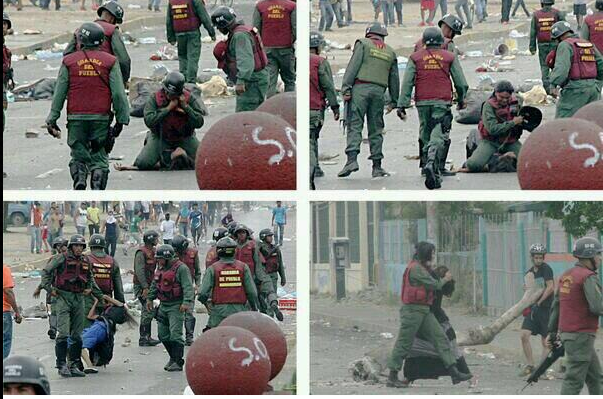[UPDATED 26.02.2014, 17:06 GMT] We were sat in his smoke filled living room. A chain smoker, he was recounting an episode of his life he'd rather not lived. Painful, as it was, he said that when the torture started the guards were laughing, joking, feeling powerful, amused even. He had gone into a hunger strike but the State had a different idea, he had to be kept alive, and so he would be forced fed by ramming tubes down his nostrils which were then removed. Every day. They kept that form of torture for 12 days, and finally desisted. When it ended, the doctors and the guards were emotionally broken. I asked how could he keep his mental sanity in such conditions, he said: "when you're not allowed to think for yourself, when you're not allowed to have, and voice, an opinion, insofar as such opinion is contrary to the diktats of the ruling party, you lose the only thing that makes us human. You become like an object in a meaningless life, and such life is not worth living. So I decided to rebel against that system and I had no fear of dying, for living in such condition was akin to being dead." Today, when I see images of the brutality unleashed by the Maduro regime on unarmed, innocent civilians, whose only "crime" is to protest, I can't help but remember Vladimir Bukovsky's words.

What does Maduro want to achieve with such brutality? Does he understand that this senseless attack on unarmed civilians can only radicalise protesters?
The images and video happened yesterday, 21 days after protests erupted around Venezuela. The victim, Marvinia Jimenez (mother of a 7-year old and partially disabled is being kept in solitary confinement), was viciously beaten and injured. On 2nd 4th February a rape attempt on a student of University of Los Andes in San Cristobal caused such indignation that her fellow students went out to protest. Some of them were arrested and sent to prison in Coro, hundreds of kilometers away from their homes and place of study. Now why would authorities do that, if not to provoke?
As I wrote yesterday in London's Evening Standard, the key issue here is crime. Experts estimate (chavismo stopped publishing figures years ago) that over 24,000 Venezuelans lost their lives to crime in 2013, and over 100,000 since chavismo took power in 1998. 97% of homicides go unpunished. Therefore criminals know that there's only a marginal chance of ever getting caught. To compound the problem, incitement of hatred has been one of chavismo central policies. First Hugo Chavez, and now his succesor, refer to opposition as fascists, imperial lap dogs, putschists, radicals. State security forces have been fed a relentless hatred discourse, one of "us against the enemies of the revolution". The official mantra was, until Chavez discovered he was going to die of cancer, "Fatherland, socialism or death". Thus the National Guard up there in the picture (already identified as Josneidy Nayari Castillo Mendoza, ID no. 19.445.226) knows not only that there's a slim chance of ever facing justice, but that such actions have been promoted, encouraged and expected by the highest executive office all the way down the chain of command.
21 days on, and Maduro is yet to address the issue of brutality and terror meted out to innocent students by the State security apparatus and paramilitary thugs aligned with his regime. In a meeting in Washington the other day I heard someone asking what the U.S. could do to diffuse tensions. My answer was to remind Venezuela of all the binding international treaties on human, civil and political rights that has signed and ratified. Radek Sikorski, one of the three European brokers that went to Ukraine to get the parties to find a solution to the escalating violence, tweeted the other day: "Naturally, like all Council of Europe members, Ukraine is treaty-bound to respect the rights of ethnic, linguistic and religious minorities." And so is Venezuela, whose ratification to be bound by international rights treaties carries the obligation of respecting life, right to assemble and to protest, while torture, use of excessive force and persecution on political grounds are forbidden. Where is the international community on this? It has been argued that the decision by Germany, France and Poland to fashion a mission to halt Putin's control over puppet Viktor Yanukovych was due to Ukraine's proximity. It would appear that the big EU beasts just aren't prepared to put up with the former KGB thug messing about so close. But what to make of the silence of Colombia and Brazil vis-a-vis the situation in Venezuela? If Maduro continues pushing the country to civil war, do Juan Manuel Santos and Dilma Roussef really think that their golden deals with chavismo will survive?
Yesterday an important development took place. Jose Vielma Mora, Governor of Tachira estate and ally of Diosdado Cabello, made some startling criticism of Maduro's handling of the crisis in a radio interview. While most Venezuelans concluded it was nothing more than a red herring, I see it as a formal declaration intended to send a message to Maduro. Unlike what most believe, chavismo is anything but monolithic. Maduro's faction (totally submitted to the Castros' designs) is not necesarily at ease with Diosdado's (with real military power). In fact, I would argue that, hidden from view, a tug of war is tearing chavismo apart, while the paramilitary (leaning towards Maduro) and the National Guard (leaning towards Diosdado) have been pretty much left to their own devices. Maduro and Cabello are jokeying for position, and one can only dread what's to come if Cabello ends up on top.
It is high time for the international community to implement a carrot and stick policy towards chavismo. 14 people have already been killed. Torture and brutality, as seen above, is part of everyday life for some and there's no sign of relenting on either side. Furthermore, repression of the sort depicted above will only lead to radicalisation and an escalation of violence. This state of affairs is, quite simply, unacceptable. The control of security forces, whether traditional or paramilitary, rests solely in official hands. Maduro and Cabello must stop this. The European Union and the U.S. could start by announcing an immediate freezing of bank accounts and seizing of assets held by proxies in respective jurisdictions. Target where it hurts. I just can't believe that Venezuela and its regional satellites can muster more diplomatic power than Mexico, Canada, the U.S. and Europe. Imperialist Putin has just been defeated in his own backyard, how come Cuba can't in Venezuela?

